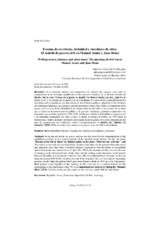Escenas de escrituras, intimidad y cuestiones de ethos. El sentido de guerra civil en Manuel Azaña y Juan Benet
Writing scenes, intimacy and ethos issues. The meaning of civil war in Manuel Azaña and Juan Benet
Autor
Minardi, Adriana Elizabeth
Editor
UCOPressFecha
2013Materia
RepúblicaEnsayo
Franquismo
Guerra civil española, 1936-1939
Axiología
Republic
Essay
Francoism
Spanish Civil War
Axiology
METS:
Mostrar el registro METSPREMIS:
Mostrar el registro PREMISMetadatos
Mostrar el registro completo del ítemResumen
En el presente artículo nos ocuparemos de analizar dos ensayos clave para la comprensión de la axiología republicana en dos períodos centrales de la historia reciente de España. Por un lado, “Causas de la guerra de España” de Manuel Azaña; por otro, ¿Qué fue la guerra civil? y La cultura en la guerra civil de Juan Benet. En estos textos se pueden trazar tres recorridos teórico-analíticos que dan cuenta de una Retórica política, entendida en los términos de un discurso epidíctico que apunta a una lección moral (López Eire, 2002): el tratamiento de la guerra civil; los usos de la intimidad en las formas retóricas del ethos y las escenas de escritura que se sitúan en la tensión entre lo público y lo privado. Asimismo, permiten comprender dos momentos: por un lado, el período 1936-1940, sellado por el final de la República, la guerra civil y la inmediata postguerra; por otro, el que va desde la muerte de Franco en 1975 hasta la Democracia. Ambos períodos confluyen en la memoria de la guerra civil como elemento pivote para la construcción del intelectual crítico. Complementarán el análisis los “Apuntes de memoria” (1936-1940) de Azaña y La cultura en la guerra civil, de 1986 de Juan Benet. In the present article we aim to analyze two key texts for the comprehension of the republican axiology in two central periods of the Spanish recent history. On the one hand, “Reasons of the war of Spain”, by Manuel Azaña; on the other, “What was the civil war?”, and The culture in the civil war, by Juan Benet. In these texts there can be planned three theoretical and analytical ways that show a political Rhetoric, understood with the terms of an epidictic speech that points out a moral lesson (Lopez Eire, 2002): the treatment of the civil war; the uses of intimacy in the rhetorical forms of the ethos and the writing scenes that place in the tension between the public and the private. Likewise, they allow to understand two moments: on the one hand, the period 1936-1940, sealed by the end of the Republic, the civil war and the immediate postwar; on the other, the period which goes from Franco's death in 1975 up to the Democracy. Both periods come together in the memory of the civil war as a central element for the construction of the intellectual critic. We will complement the analysis by taking the “Memory Notes” (1936-1940) by Azaña and The culture in the civil war, dated 1986, by Juan Benet.

